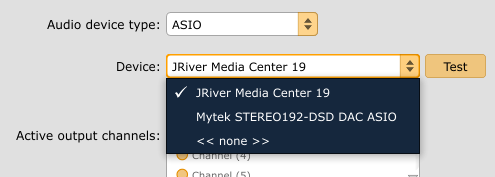OverviewMC19 adds the ability to use the JRiver audio engine from other programs that can output using ASIO.
In a third-party program with ASIO support, you will see 'JRiver Media Center 19' show up as a possible output device. Here's an example:

When you start playback in the other program, MC will launch and start playback in the current zone.
Playback will go from the other program, into MC, and out the configured output in MC. All DSP processing is supported in MC.
When you stop playback in the other program, MC will also stop.
For best results, you will want to configure a small buffer size in Options > Audio to reduce latency. Also, the latency added by convolution may be too great to make this feature useful with convolution enabled.
Real-World Use CaseThere are a few real-world test cases where this might be interesting.
I will describe one I have. I use MC as the pre-amplifier at home and connect directly to a power amplifier. Sounds played outside of MC do not sound good, because the channel routing, levels, etc. will be wrong (by a lot) since I depend on MC for this functionality.
I also have an older Roland Piano that's connected to the system by midi. I use a program called Pianoteq as the engine to make the piano sound. The JRiver ASIO driver allows me to output from Pianoteq through the home sound system and get JRSS, Room Correction, and other processing.
LatencyThe latency of the ASIO input, IPC, buffering, and final output is quite low. With a fast system, the latency is low enough for piano playback, a latency sensitive operation. If you were to use this driver for video playback, it is likely that the total audio latency will be less than the latency of a typical home theater display.
WDM Driver (help wanted)We hope to someday create a Windows driver (WDM) of the same thing so that any program can use this. This would open this feature up to games, web browsers, etc. If you're a WDM audio driver programmer and would be interested in a project, please email matt [at] jriver (dot) com.

 Author
Topic: NEW: JRiver audio engine as an ASIO driver (Read 92405 times)
Author
Topic: NEW: JRiver audio engine as an ASIO driver (Read 92405 times)

